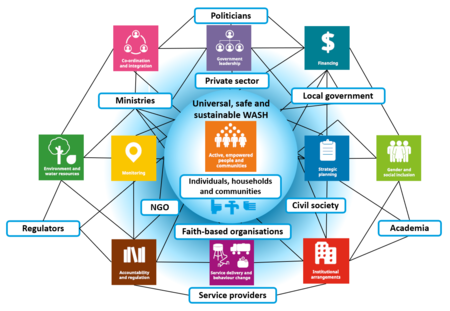WaterAid's vision is a world where people facing poverty and marginalisation have access to sustainable and safe water, sanitation and hygiene (WASH).
We aim to achieve this by strengthening WASH systems that are underpinned by human rights principles. WASH systems are made up of:
- actors (people and institutions)
- factors (social, economic, political, environmental, technological)
- interactions
System strengthening is a process of analysis, implementation, adaptation and learning, undertaken with an understanding that inclusive and sustainable WASH access is the result of interactions between multiple actors (people and institutions) and factors (social, economic, political, environmental, technological) in a complex, dynamic system. To strengthen WASH systems, we work at local, national and global levels, and use a range of tactics.
How we work
Analysis, evidence generation and research
Our first task is to understand the problem and identify where we have the best chance of generating change. We work with local communities and institutions to identify the barriers people face in accessing sustainable and safe WASH. We also do research to gather the evidence needed to advocate for improvements to WASH systems.
Partnerships
We cannot tackle the barriers people face in accessing sustainable and safe WASH alone. We therefore work with:
- local institutions and communities
- local and national governments
- civil society and non-governmental organizations
- academic and research institutes
- the private sector
To make our work as effective as possible, we also share best practice and the lessons we have learned with others, and bring different institutions together to increase their commitments to improving WASH.
Service delivery and behaviour change
We deliver WASH services that are inclusive, we promote hygiene behaviour change, and we demonstrate how WASH can be sustained and expanded. We also support communities and local institutions to make their WASH facilities more resilient to climate change and improve water security and the management of water resources.
Institutional strengthening and training
We strengthen the skills and knowledge of service providers and local governments to fulfil their roles and responsibilities. We support local institutions to better plan, finance and monitor the performance of WASH services. We strengthen the relationships between service providers and their consumers to make sure providers are responsive and accountable. We also promote the participation and leadership of women in decision-making around WASH.
Community empowerment
It is crucial that communities are empowered and can take ownership of their WASH facilities and services. To support this, we aim to amplify the voices of local people, by empowering communities to access information about WASH and demand their human rights to water and sanitation.
Advocacy and campaigning
We use all of these experiences and research to raise the profile of WASH in regional and global development spaces – such as the World Health Assembly and COP26 – and advocate for policy change, sector reform and improved financing for WASH.
Learning and adaptation
We regularly reflect on the progress we have made, the lessons we have learned and the changing context. We use this information to adapt and improve what we do.
What challenges do we face?
We work in countries where the permanent institutions responsible for delivering these services do not have enough staff or money, nor are they accountable to all sections of the population. Government-led planning, monitoring and budgeting processes can be weak with insufficient finance allocated to major maintenance, behaviour change and completion of the sanitation chain. Deeply ingrained power dynamics, as well as gender and social norms can also undermine progress.
There are often barriers that prevent the private sector from getting involved, particularly in rural areas. WASH is not systematically integrated as part of climate adaptation funding and is generally underfunded compared to other human rights such as health and education. The sustainability, scalability and inclusiveness of WASH services are threatened by all these weaknesses in the ‘system’.
We believe that by working together to strengthen water, sanitation and hygiene systems, we can achieve our mission and help entire communities unlock their potential, break free from poverty and change their lives for good.
Top image: Fasika, 15, collects water in her village in West Gojjam, Ethiopia, July 2019.



